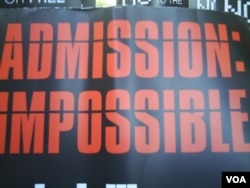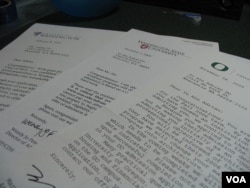You've toiled very hard for this. I know you have. Some of you may have been planning out your college applications since the early years in high school, while others worked late nights to get things done at the last moment. I’m sure a few of you are looking at this calmly, holding an early decision acceptance letter in your hand. Not all of us can be that lucky. I wasn’t.
I still remember getting deferred from my early decision school, Lafayette College. I could not have been more heartbroken. There was nothing I wanted more at that point in time than to be accepted at Lafayette, but I had to move on and start applying to the colleges on my regular decision list. And things turned out pretty well for me later on, but we’ll come back to that.
If you’re in that situation, don't blame yourself. You've just gone through an example of how harsh the U.S. admissions process gets at times, given the huge application pool and limited space for incoming students. I know it is stressful and disappointing to have to start all over, and raise your hopes and optimism yet again.
I had many friends in my high school who got depressed after receiving their first rejection, and didn’t have enough courage to even apply to other schools. When I would ask them why, they would reply that clearly they were not qualified enough.
This bothered me a lot.
You Never Know!
First of all, it’s not all about 'qualification.' I had that frame of mind too when I started my applications. At first my resume looked like a New York Times article; I would often find myself sifting through my portfolio, and chasing my guidance counselor, looking for every little thing I could add to my application. But, after I saw classmates who looked 'qualified' to me being rejected like there's no tomorrow, it became clear that the admissions process isn't just about how you or the people around you perceive your qualification to attend a school.
Admissions officers are pretty open about the fact that they emphasize factors that go beyond your straight ‘qualifications’ – your essays, recommendations, extracurricular activities, etc. But they also look at a whole range of intangible things like your background, how you fit within the overall admissions class, whether you’re a good fit for the school. And there’s no way to predict the outcome of that.
Some of my classmates who had earlier given up hope started applying to their safety schools in other countries like India and China, while some mustered the courage to continue with their regular decision (RD) applications. It was interesting to note that the students who later applied RD to U.S. schools fared about as well with their decisions as those who decided to just apply elsewhere.
So, the moral of the story is: “You Never Know.” You never know how things will turn out for you once your application reaches the admissions office. It’s like playing a game of cards. There’s always a probability that you can win but you can never be too sure of the outcome. Once the cards are dealt, you take the risk anyway and hope for the best.
Dealing with it
After being rejected in early decision, there were a few things that I and my friends did differently for the regular decision round, which helped us during the application and waiting period:
- First of all, keep calm. Being over-anxious and nervous will not help you or your admissions decision in any way. Practice yoga or hit the gym if it helps.
- Try to occupy yourself as much as you can. Do a part-time job or assist your family with household chores. Sitting idle will only develop anxiety and frustration about your impending decisions.
- Interact with the admission officers from time to time (that's called displaying 'continued interest' in the college).
- Keep your application updated. Inform the college about your latest activity or developments by writing an essay that summarizes it and your continued interest in the college.
-And finally, wait for the decisions calmly. I suggest that you go on a short trip outside your town during this phase to escape ‘the hangover’ of the impending decisions.
In this way, I and my friends got closer to the decisions without even noticing the passage of time. By the time, the decisions arrived; I and my friends were no longer blaming the admissions officers or ourselves for the situation we were in. Let’s just say, we were quite elated at our decision letters.
Moving Ahead
So, the next time, you find yourself worrying about the decision letter or being depressed about hearing a rejection, read this article one more time. Think, analyze the situation and keep MOVING FORWARD. There are more things to life than being stuck at the helm of the moment, and rusting in grief and agony. Most importantly, never let your optimism die. Optimism is like a fuel to the journey of your life. If it runs out, if not physically, you will be spiritually dead.
And, by the way, if you are still interested in what happened to my applications later, here's the rest of the story. After I got rejected from Lafayette, I applied to a lot more schools (I would not like to share the exact figure). Got waitlisted into 6, accepted at 4. And, I finally decided to join the College of Wooster. I have never regretted my decision thus far.
I still remember getting deferred from my early decision school, Lafayette College. I could not have been more heartbroken. There was nothing I wanted more at that point in time than to be accepted at Lafayette, but I had to move on and start applying to the colleges on my regular decision list. And things turned out pretty well for me later on, but we’ll come back to that.
If you’re in that situation, don't blame yourself. You've just gone through an example of how harsh the U.S. admissions process gets at times, given the huge application pool and limited space for incoming students. I know it is stressful and disappointing to have to start all over, and raise your hopes and optimism yet again.
I had many friends in my high school who got depressed after receiving their first rejection, and didn’t have enough courage to even apply to other schools. When I would ask them why, they would reply that clearly they were not qualified enough.
This bothered me a lot.
You Never Know!
First of all, it’s not all about 'qualification.' I had that frame of mind too when I started my applications. At first my resume looked like a New York Times article; I would often find myself sifting through my portfolio, and chasing my guidance counselor, looking for every little thing I could add to my application. But, after I saw classmates who looked 'qualified' to me being rejected like there's no tomorrow, it became clear that the admissions process isn't just about how you or the people around you perceive your qualification to attend a school.
Admissions officers are pretty open about the fact that they emphasize factors that go beyond your straight ‘qualifications’ – your essays, recommendations, extracurricular activities, etc. But they also look at a whole range of intangible things like your background, how you fit within the overall admissions class, whether you’re a good fit for the school. And there’s no way to predict the outcome of that.
Some of my classmates who had earlier given up hope started applying to their safety schools in other countries like India and China, while some mustered the courage to continue with their regular decision (RD) applications. It was interesting to note that the students who later applied RD to U.S. schools fared about as well with their decisions as those who decided to just apply elsewhere.
So, the moral of the story is: “You Never Know.” You never know how things will turn out for you once your application reaches the admissions office. It’s like playing a game of cards. There’s always a probability that you can win but you can never be too sure of the outcome. Once the cards are dealt, you take the risk anyway and hope for the best.
Dealing with it
After being rejected in early decision, there were a few things that I and my friends did differently for the regular decision round, which helped us during the application and waiting period:
- First of all, keep calm. Being over-anxious and nervous will not help you or your admissions decision in any way. Practice yoga or hit the gym if it helps.
- Try to occupy yourself as much as you can. Do a part-time job or assist your family with household chores. Sitting idle will only develop anxiety and frustration about your impending decisions.
- Interact with the admission officers from time to time (that's called displaying 'continued interest' in the college).
- Keep your application updated. Inform the college about your latest activity or developments by writing an essay that summarizes it and your continued interest in the college.
-And finally, wait for the decisions calmly. I suggest that you go on a short trip outside your town during this phase to escape ‘the hangover’ of the impending decisions.
In this way, I and my friends got closer to the decisions without even noticing the passage of time. By the time, the decisions arrived; I and my friends were no longer blaming the admissions officers or ourselves for the situation we were in. Let’s just say, we were quite elated at our decision letters.
Moving Ahead
So, the next time, you find yourself worrying about the decision letter or being depressed about hearing a rejection, read this article one more time. Think, analyze the situation and keep MOVING FORWARD. There are more things to life than being stuck at the helm of the moment, and rusting in grief and agony. Most importantly, never let your optimism die. Optimism is like a fuel to the journey of your life. If it runs out, if not physically, you will be spiritually dead.
And, by the way, if you are still interested in what happened to my applications later, here's the rest of the story. After I got rejected from Lafayette, I applied to a lot more schools (I would not like to share the exact figure). Got waitlisted into 6, accepted at 4. And, I finally decided to join the College of Wooster. I have never regretted my decision thus far.





